Vancouver housing bubble sags. Toronto down 3.4% from peak. Calgary and Edmonton back to 2007. Montreal sets new record. National index ticks up the least for any May in 21 years of data.
Home prices across major metros in Canada ticked up 0.5% in May from the prior month, the slowest rise for any May in the 21-year history of the Teranet-National Bank House Price Index. “If seasonally adjusted, the index would have been down 0.4% on the month,” the report said. But real estate is local, with wide variations from market to market, and so here we go.
Vancouver:
In Greater Vancouver, house prices, instead of rising seasonally, declined 0.2% in May from April, the 10th month in a row of declines, according to the Teranet-National Bank House Price Index. The index is down 5.0% from the peak in July 2018, the sharpest 10-month decline since July 2009. And it’s down 4.1% compared to May 2018:
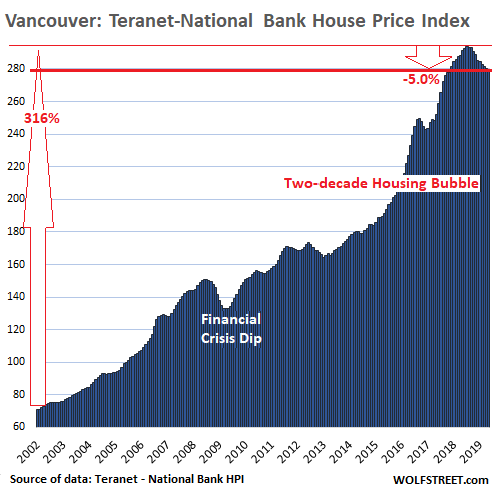
Vancouver was one of the most splendid housing bubbles the world has ever seen as prices more than quadrupled in 16 years, skyrocketing 316% from January 2002 to the peak in July 2018. But this splendid bubble has developed some serious leaks.
The Teranet-National Bank House Price Index tracks single-family house prices, based on “sales pairs.” It compares the sales price of a house in the current month to the price when the same house sold previously, often many years earlier. The methodology of “sales pairs” eliminates some of the issues associated with median-price indices, which for Vancouver are pointing at much steeper price declines.
In the US, the S&P CoreLogic Case Shiller index also uses the “sales pairs” method, so we can compare the data for the Vancouver housing bubble to the San Francisco Bay Area housing bubble to see which is the most splendid, in one chart, with Vancouver as black columns and the San Francisco Bay Area as red columns, and with both indices converted into “percent change from January 2002.” Note how Vancouver’s housing market only dipped during the big-bad Financial Crisis while San Francisco’s slumped deeply for four years:

Toronto:
House prices in the Greater Toronto Area (GTA) rose 0.7% in May from April, according to the HPI, and are up 2.6% from May last year, but remain down 3.4% from the peak in July 2017. Despite minor ups and downs, the index has been essentially flat since July 2018.
Over the 15 years from January 2002 through the peak in July 2017, house prices more than tripled, with the index soaring 218%. But Toronto cannot hold a candle to Vancouver, where prices had quadrupled over the same period. For perspective, all charts here are on the same scale. Hence, Toronto’s chart shows more white space:
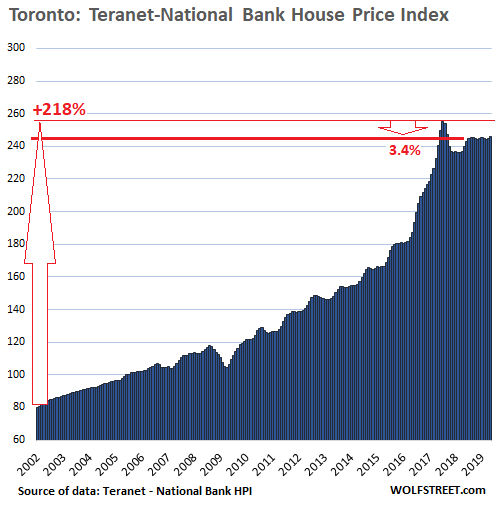
Victoria:
House prices in Victoria, BC, followed seasonality and rose 0.7% in May, according to the Teranet-National Bank House Price Index. The index had more than tripled between January 2002 and the peak in September 2018. But prices are down 0.4% from May last year and 2.7% from the peak. The chart is on the same scale as Vancouver’s, hence the additional white space:
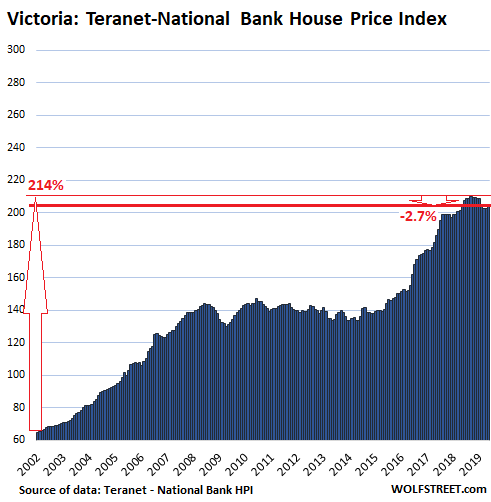
Winnipeg:
House prices in the Winnipeg metro area ticked up 0.5% in May from April, after a hard 2.0% drop in the prior month, according to the HPI. The index is down 3.7% from the peak in September 2018. This took the index back to where it had first been in August 2016.
In the Winnipeg metro – which is surrounded by lots of land and I mean on an epic scale – house prices had nearly tripled in the 12 years between January 2002 and the peak in September 2014, with just a hiccup during the Financial Crisis. Since September 2014, house prices have stalled however, and with the decline over the past six months, they’re now up only 2.5% from where they’d first been nearly five years ago:

Montreal:
For the metropolitan area of Montreal, the House Price Index rose 0.5% in May from April to a new peak. The index has risen 160% over the past 16 years, not even dipping during the Financial Crisis. While this surge would have been huge by just about any standard, it’s only about half of the Vancouver mindblower over the same period. Hence, the white space is beginning to dominate the chart:

Quebec City:
House prices in the Quebec City metro rose 0.8% in May from April, continuing their mild ups and downs that have kept the index essentially flat since July 2014, after a white-hot 160% gain in the 12 years from January 2002 through July 2014:

Edmonton:
Canada has two major oil towns, Calgary and Edmonton, whose economies are dominated by oil booms and busts, and housing too follows oil. The prior oil boom caused house prices to skyrocket 87% from June 2005 through October 2007. Just nuts! This bubble promptly collapsed, and house prices are still not back where they’d been 12 years ago, and declined again in May, despite what should have been a seasonal increase. The HPI is down about 6% from its peak in October 2007 but thanks to the glorious bubble in 2005-2007, it remains up 136% from January 2002:
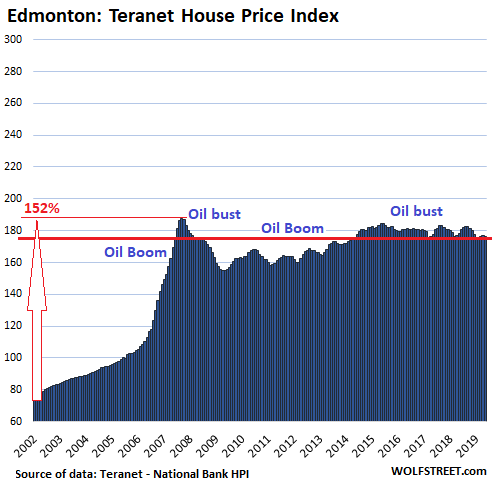
Calgary:
Oil booms and busts, always. House prices in the Calgary metro ticked up 0.3% in May from April, but remain down 7% from their peak in October 2014, and are back where they’d first been 12 years ago in July 2007. The HPI has gained 123% since January 2002, compared to Vancouver’s 316% gain:
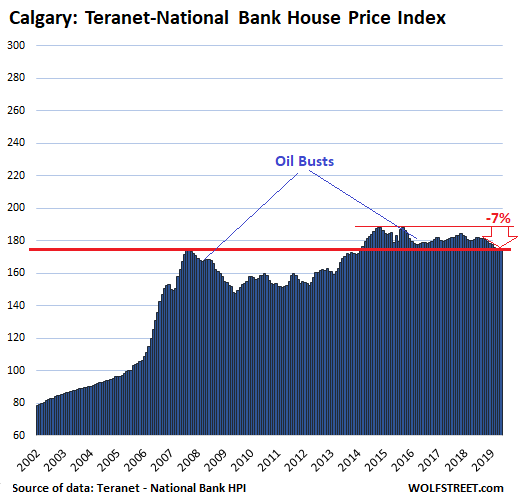
House price movements that are measured by comparing the price of the same house as it changes hands over time – “sales pairs” method, such as the Teranet-National Bank House Price Index in Canada or the S&P CoreLogic Case Shiller index in the US – in fact measure how many dollars it takes to buy the same house over time. When the price of the house doubles, it’s not an indication that the house got twice as big or twice as opulent, but that the dollar has lost its purchasing power with regards to the same house, and it now takes twice as many dollars to buy the same house. And so these indices are good measures of house price inflation, similar to indices that measure consumer price inflation.
Enjoy reading WOLF STREET and want to support it? You can donate. I appreciate it immensely. Click on the mug to find out how:
![]()


I live in Van. Now seems like a pretty good time to go 20/1 leverage and put 5% down on a condo. In 20 years the price will quadruple again and my 600 sq foot condo will be worth 2 million! I can’t lose!
Yeah. Right. What could go wrong? As Mark Twain once said (and I may be paraphrasing), “If history doesn’t repeat itself, it sure does rhyme.”
If you can get someone to loan you the 5% down, go for it! You can’t lose!
I see that marijuana is now legal in Van. You have been smoking the good stuff. :)
It’s been legal across the country for a bit now but ok.
Sydney, Australia home prices are down 10%. Vacancies are rising while prices are falling. There are empty storefronts, empty condos and more multi-family completions on the way.
Chinese vehicle sales are down 16% from a year ago. It seems to be the largest yearly drop in Chinese vehicle sales on record.
Chinese home buying fever remains high.
China’s further crack down on Hong Kong may have increased interest in Canadian real estate investment.
“Now this is not the end. It is not even the beginning of the end. But it is, perhaps, the end of the beginning.”
Winston Churchill
The Canadian housing market is essentially flat. It would be interesting to know what is keeping these local bubbles going, but I guess we will never know.
Toronto developer’s come up to small towns like Midland and buy up properties at less than 300,000 and duplex them in a couple weeks and rent them out. The others are small Toronto business selling and buying up properties for their family members.
I need numbers. I’ve been hearing these kind of explanations for over a decade.
Those prices in the metro areas are a long way from what is affordable for the locals. IMHO, foreign money drove up the prices in a large number of sales, but many of those overpriced homes, as a result, are not worth the price the fools are paying. Many of those old pre-WW2 homes in Toronto, for example, are gross!
Thanks to China’s Xi, suddenly there is more interest from Hong Kong for Vancouver real estate.
Strange how housing bubbles keep getting reflated!
I dont see any bubble bursting as of now
It rose up 100s of percent and down just few..
Relax Jon just the first innings….grab some popcorn and enjoy the show
No one said the bubble has popped, but the bubble has stopped inflating. No more air in the helium tank to keep it expanding. The question is will it stay flat, will it burst or will someone find a new helium tank and keep this thing growing a couple more years?
People been talking bust for years. I havent seen it since 1989-1992 in Toronto.
BTW how often do busts happen anyway?
Not too often I dont think?
“This time is different”?
Sit down, save your commission checks, and enjoy the show….the fun is about to start soon….
If currency deflates faster than the price declines
of housing then investors still win
Exactly. Canadian inflation is increasing (minimum wage raised and low interest rates) and so it all stays flat. The dollars you earn in future are more but worth less and so inflation helps pay down that debt.
Very good article and thanks for posting it.
There are lots of housing refugees on Vancouver Island keeping sales up and prices high (too high, imho). Plus, rentals are scarce and really expensive. My sister-in-law bought an acre of semi-waterfront several years ago…for about 200 K; down in Fanny Bay, just a bit east of Courtenay. (Semi- WF means one lot off/away from the water). It had septic and hydro already installed, and now is completely landscaped. They just finished a basic but very nice rancher for 300K, (1800 sq ft). As a carpenter I can state the building quality is first class, but there are no extravagant fixtures or extras. 9′ ceilings, Hardy Plank siding, steel roof, Pacific Energy airtight wood fireplace, heat pump, decent appliances, etc. So, they have 500 K spoken for to date and it was just appraised at over 800K, a nice increase during the 3 years of first land purchase to house completion. In today’s market I would guess it would sell within one week. Further up Island there is still lots of building activity and no sense it is slowing down any time soon, mainly because RE is still so much cheaper up here than Victoria or Vancouver.
regards
There are Help Wanted signs in many stores and restaurants, and I have previously mentioned in other articles thay can’t find enough workers for forestry, our industrial mainstay.
The graphs and charts, to me, show a flat market near the top of a bubble. If and when it bursts will be anyone’s guess, although I suspect some external black swan event will be the first kick at it. However, if it is a shooting war with Iran oil will skyrocket and the Patch will take off once again. Plus, Trans Mountain pipeline was just re-approved and pipe is supposed to start being laid this summer. 1/3 of required stock is already in stores and just waiting to be used.
Excuse the format as I hit the enter key somewhere along the way and inserted a paragraph where it didn’t belong, but I did mean the regards :-) Just not in the middle of the comment!
Rumour has it (I just started it) that there will be an ‘edit’ function on WS just before hell freezes over.
Oil will no longer have an effect to create any movement in real estate. We are at pre 1980 levels of consumption. Many don’t get the lies they have been fed on oil. It is over, every bit of oil going to market in north america is at a lose. It is about the only money velocity left at millions in loses per day. Oil should be probably $20 a barrel. It’s a grand illusion, and better wake up fast.
Are you kidding me. Last time I checked we are now up to 95 million barrels a day. Was about 50 million back then
Canada adding 1% to the population by immigration every year. 1000 people a week on average. They need houses. House construction is now distorting the economy. Good now … not so good later.
Is not a distortion if it keeps happening all the time.
In fact, housing bubbles have got quite predictable compared with the Stock Market, in fact unlike the stock market, hoising bubbles are still mostly caused, used and crashed by human beings.
Are the immigrants coming with boat load of money ?
That’s an excellent question: somehow I doubt they all carry big suitcases stuffed to the brim with cash.
Canadian immigrants are some of the best educated in the world. I know dozens of well qualified expats from Asia and Africa who are now Canadian citizens, living in Canada, and leading productive and prosperous lives.
There is no housing bubble in Canada, it’s the real deal – and plenty of room to grow.
The rich Chinese have stopped coming to Canada. The source is straight from the local Chinese in Canada. The peasant Chinese are now the only ones coming here. This is very bad news for Vancouver as home prices have to fall 75 percent for the locals to buy a house on the locals income.
There is a twitter page (below) which chronicles the dramatic price drops at the high end of the Vancouver, BC housing market. Quite a bit more dramatic than the broad index indicates, I think.
https://twitter.com/VanREflipflops
Even with residential rents falling 20 percent the last 4 years in Edmonton it still costs twice as much to rent a resale townhouse than it costs to own one with a zero down payment. With falling mortgage rates in Canada soon it will cost 3 times more to rent than to own in Edmonton.
“Winter is Coming” (Game of Thrones)
It appears that 2015/2016 was when the slope of growth for Toronto and Vancouver took off (compared to the others). Why? A few possibilities — peak capital flight from China, the Umbrella movement in HK, Canada’s Central Banker Poloz lowering rates against expectations. Obviously something happened to distinguish Toronto/Van trajectories from the others at this point.
Can someone tell me the likelihood that real estate in Toronto and Vancouver will come down to be affordable with local incomes? How long will it take? To get there — Are incomes likely to rise, prices to fall, or some combination? How much of the price growth in the past 10 years is due to QE money, flight capital from China, domestic mania, and lax regulations? Just curious to know what people think here.
Vancouver is a walled city, my friend.
People come here from all over the world to visit the parks and beaches, but then they discover the prohibitive cost of renting ($1600 pr mo), or how young people are struggling n the service sector (restaurants, building industry).
Vancouver real estate might have been affordable 30 years ago when there were real unionised jobs, but now it requires family and connections.
Wow ! That could take far more space than is available here to answer ?
Just my opinions: You won’t have to wait much longer to find out which way it’s going to go because with the U.S. Fed moving rates down at least twice this year(2019)… whatever is coming to a head, and contrary to the normally stimulative effect of lower rates(BoC as well)…. far more going on and things in Canada could well continue southbound.
Rosenberg has an interesting take, and remember here THIS is NOT some “youtube” type wacko ? The hard part with Rosey is he’s just never too far off “eventually”…. only the exact timing part.
Pay particular attention from 4:45… and then HOLD ONTO YOUR CHAIR AT 6:10 !
https://www.bnnbloomberg.ca/video/get-u-s-dollar-exposure-to-prepare-for-coming-economic-pain-david-rosenberg~1708327
In Connecticut in 1988, house prices started to drop. They lost 50% or more in some towns. It took a decade for the market to retrace to 1988 levels. This was where prices had only doubled in 15 years, not quadrupled. The next correction could be a doozie!
Bubble prices remain flat in Canada because the government is doing nothing to stop billions of dollars flowing in through money laundering. Super painful times will continue… Stock pile on essentials and big bottles of patience while you can. I think the most important factor we all should look for is when confidence breaks in the market.
Just my opinion, but this real estate market is STILL…. and very simply here… UN-sustainable !
I could quote the old “if it has feathers, waddles and quacks, I call it a duck” spiel, but I don’t have to, and it’s NOT just the larger markets like Vancouver,Toronto let be Edmonton, Calgary, etc., etc. even rurally in many areas.
When family incomes have not kept pace, and they haven’t for close to 20 years, and you have had the price increases we’ve seen during the same period fueled primarily by cheap money, and dirty money devoid of fundamentals other than skyrocket personal Debt levels ?…. well…. I believe we could well see 2005 Prices on average across the board nationally no matter where you are, and even lower in some areas.
The only way out of this mess would be a massive inflationary curve fueled by even cheaper money than we’ve seen, and with the US Fed getting ready to lower it could happen here…. nonetheless, there would still be a very painful and extended lagg until wages get dragged along with it. IMO, Look out BELOW for awhile yet !
Saw this today.
“Hong Kong crisis could lead to a big resurgence in Vancouver’s housing market”
Will be interesting to see what the market reflect in the coming months.
https://dailyhive.com/vancouver/hong-kong-extradition-bill-china-vancouver-housing-market-june-2019?fbclid=IwAR3SzqUxz1WIsOvTQUpKCcTsHrVLLV51boWcsvC1oaUDdSxyL9PdXWqu6kU